R-Evolution case study
Transforming a private studio into a multi-disciplinary wellness hub
The client
R-Evolution, a prestigious private studio offering private training and a range of wellness services including osteopathy, physiotherapy, and dietary guidance.
Challenge
R-Evolution sought to expand its reach and establish itself as a holistic wellness studio. They aimed to transition from a solo-operated studio to a thriving business with a larger team and range of professionals, while maintaining the impeccable quality of their services, which characterized the initial success.
My role
Successfully combining business, strategy with design and marketing solutions.
When
2017 – ongoing
Collaborations & stakeholders
Owner of R-Evolution
I built a strong coherend brand across touchpoints, contributing to transforming a one-man personal studio into a thriving multi-disciplinary business and multiplicating the turnover.
Today, R-Evolution employes 10 professionals (and counting) and has moved into a larger space. It is running full capacity, often with waitlists, and is hugely popular among existing as well as new clients.
The owner and staff members also dedicate their time to teaching graduates through courses accredited by local Italian authorities, contributing to the development of future professionals. I support them by designing all training materials.
Although I can only claim partial credit for R-Evolution’s success, given the exceptional quality of their services, I take pride in the role I play in this endeavor.
Research: the steppingstones towards a successful brand
The R-Evolution brand is the result of a lot of research, conducted at the outset, with ongoing updates.
I led two major major research phases: one prior to the design process and another during the Covid-19 pandemic, a period marked by considerable upheaval for businesses like this one, due to Italy’s strict lockdown measures and prolonged public anxiety.
My role was instrumental to ensuring brand consistency across physical and digital touchpoints, facilitating the transformation of a small studio into a thriving business with increased revenue streams.
In the first round of research I engaged with the existing clientele as well as potential new customers. The aim was to understand what drove them to seek the services of the studio, areas they felt were lacking, opportunities for improvement, and their personal objectives.
This research served as the cornerstone for crafting a strategic communications and marketing blueprint, laying the groundwork for the studio’s transformation and it influenced strategic business decisions.
At the time, we were exploring avenues to expand our offerings, including the development of a fitness app to facilitate home workouts and a YouTube channel featuring exercise tutorials. Following our research, we decided to proceed with both initiatives. While the YouTube channel has achieved remarkable success and continues to thrive, the development of the app was temporarily postponed. This decision stemmed from the emergence of more lucrative business opportunities, particularly a resurgence of enthusiasm for in-person training following the Covid-19 pandemic, which proved to be more financially rewarding.
The second major round of research took place during the Covid 19 pandemic and was conducted mainly with existing customers, to help set up a temporary business and communications plan.
Interviews and affinity maps
Interview details (sample questions) - text version
Sample interviewees
- My doctor/physiotherapist is happy with me, and I feel proud of myself.
- During the quarantine I managed to exercise regularly. I feel a lot better and have even managed to lose a bit of weight.
- I lose weight while my body develops muscles and stays trim and healthy.
- I have diabetes and need to exercise, but I am worried I will be unable to keep my blood sugar levels under control and feel sick.
- I want/need to lose weight.
- My back/hip/leg etc. stops hurting.
- I sit down all day because of my job and have developed a chronic back-ache.
- My doctor says I have to exercise but I don’t know where and how to begin.
- My doctor has advised me to exercise regularly.
- I have a physical issue and my physiotherapist is encouraging me to exercise regularly.
- I want to return to what I did before (I got a physical impediment).
- I have a chronic back pain/other minor issue and can not use standard online tools for exercising because I risk to hurt myself.
- I have diabetes and my doctor says physical exercise is crucial to keeping my blood sugar under control.
“Why do you exercise?”
- I want to improve my sports performance and/or the techniques (personal or professional ambition).
- I want to maintain a strong and healthy body.
- I want to lose weight.
- I suffer from anxiety and depression and feel better when I exercise regularly.
- I have diabetes and my doctor says physical exercise is crucial to keeping my blood sugar under control.
- I want to have an attractive body.
- I have a physical issue and my physiotherapist is encouraging me to exercise regularly.
- It is my “me-time” and I don’t feel guilty about it.
- Girls like muscular guys.
- When exercising I forget my worries/problems.
- I want to age in a healthy way, and know a strong body is important.
- I sit down all day because of my job and have developed chronic back-pain.
- I want to return to what I did before (prior to a physical impediment).
- My doctor has advised me to exercise regularly.
“What happens when you exercise regularly?”
- I push myself to my limit, get rid of negative energy and afterwards I feel satisfied: I have done what I set out to do.
- My doctor/physiotherapist is happy with me, and I feel proud of myself.
- Exercising regularly pushes me towards a generally healthier lifestyle (food/less alcohol stopped smoking).
- I de-stress after work (If I exercise in the evening).
- My relationships are happier and more serene because I feel more energized and positive and get less impatient with those around me.
- My back/hip/leg etc. stops hurting.
- I lose weight while my body develops muscles and stays trim and healthy.
- I feel happier and have more energy.
- I have done something important and positive for myself.
- I don’t want to disappoint my trainer, on the contrary, I want him/her to be happy with my progress.
- I feel more confident.
- When I exercise, I feel good about myself – it is my “me-time” and I don’t feel guilty about it!
- I feel satisfied by having started the day and already accomplished something positive (If I exercise in the morning).
“What happens when you don’t exercise?”
- I feel guilty, because I have missed a step in my daily routine.
- I feel frustrated because I know I should have exercised and for any given reason I didn’t do it.
- I have diabetes, and controlling my blood sugar becomes challenging.
- I am more often in a bad mood/I feel anxious or sad.
- My back/hip/leg hurts more than ever: I know it’s my own fault and I also have to take pain-killers.
- I feel guilty because I cancelled the appointment with my trainer.
- I don’t sleep well.
- I feel guilty.
- I now feel I have to make up for what I didn’t do today by training double the amount tomorrow. Then know I can’t do it.
- I obsess about losing motivation to exercise regularly if I miss one session.
- I put on weight.
- I tend to get short-tempered and impatient with those around me.
Other findings from interviews
- I would like to exercise regularly with a personal trainer, but can not afford the cost.
- I am a bit lazy and find it difficult to be consistent in my training routine.
- I have a chronic back pain/other minor issue and can not use standard online tools for exercising because I risk to hurt myself.
- I would like to exercise with some friends but don’t know anyone who will go with me.
- I am terribly out of shape and everyone else in the gym is in better shape than me, it makes me feel inadequate.
- I have a busy schedule and find it difficult to find time to exercise.
- I would like to have a personalized program based on my physical shape and my fitness goals.
- I have tried training with standard online tools but I get bored because it’s always the same.
- I miss two exercise sessions, feel guilty, drop out and then hate myself for being weak and inconsistent.
- I am overweight and don’t like to show my body in gym clothes in a gym, I want to lose some weight first.
- I work shifts and can not go to the gym at fixed times.
- My doctor says I have to exercise but I don’t know where and how to begin.
- I have diabetes and need to exercise, but I need to be sure to keep my blood sugar levels under control.
- I exercise every once in a while using free online tools, but it doesn’t really give me the desired results.
Affinity diagrams - text version
(Physical): health/diet related
Maria 45 years, employee
Exercises every morning because of a chronic back pain. Would like a personalised program prepared for her by a physiotherapist
Miriam 33 years, beautician
Exercises very regularly, mainly for aesthetic reasons.
Alex 54 years, dentist
Has always exercised and enjoys it but has little time. Appreciates flexibility and personal challenges.
Anna 55 years, employee
Has a hip problem, exercise prescribed by physician.
Barbara 44 years, nurse
Exercises regularly with a personal trainer. Works in shifts and is often tired after work.
Allan 68 years, retired
Wants to maintain a strong body and overcome some small age-related physical issues.
Caroline 47 years, employee
Runs regularly but has back problems and would like to exercise with a program tailor for her.
Patty 54 years, historian and manager
Exercises regularly with a personal trainer, mainly to be in good physical shape and to lose weight.
Andy 39 years, HR manager
Plays football regularly but would like to add a training program to increase muscles.
Athletic/fitness relates
- I exercise every once in a while, using free online tools, but it doesn’t really give me the desired results.
- I want to improve my sports performance and/or the techniques (personal or professional ambition).
- I want to maintain a strong and healthy body.
- I would like to have a personalized program based on my physical shape and my fitness goals.
- I have tried training with standard online tools but I get bored because it’s always the same.
- During the quarantine I managed to exercise regularly, and want to maintain the physical shape I have gained.
- I push myself to my limit, get rid of negative energy and afterwards I feel satisfied that I have done everything I should.
- I want to age in a healthy way, and know a strong body is important.
- Exercising regularly stimulates me towards a generally healthier lifestyle (food/less alcohol/I stopped smoking).
Mental health, self-esteem related
- I am overweight and don’t like to show my body in gym clothes in a gym, I want to lose some weight first.
- At the gym I meet new people with my same interests.
- I don’t want to disappoint my trainer, on the contrary, I want him/her to be happy with my progress.
- I want to have an attractive body.
- I de-stress after work (If I exercise in the evening).
- I sleep better.
- I suffer from anxiety and depression and feel better when I exercise regularly.
- I feel satisfied by having started the day and already accomplished something positive
- (If I exercise in the morning).
- While exercising I forget my worries/problems.
- I feel more confident.
- My relationships are happier and more serene because I feel more energized and positive and get less impatient with those around me.
- I am terribly out of shape and everyone else in the gym is in better shape than me, it makes me feel inadequate.
- I am a bit lazy and find it difficult to be consistent in my training routine.
- I miss two exercise sessions, feel guilty, drop out and then hate myself for being weak and inconsistent.
- I have done something important and positive for myself.
- When I exercise regularly, I feel happier and have more energy.
- I would like to exercise with some friends but don’t know anyone who will go with me.
- I feel guilty because I am not consistent about exercising.
- When I exercise, I feel good about myself – it is my “me-time” and I don’t feel guilty about it!
- Girls like muscular guys.
- During the quarantine managed to exercise regularly and have noticed the positive effect on my mood even during those difficult times.
During the primary research phase, I conducted interviews with a total of 14 individuals: 10 existing customers and 4 potential new ones.
Subsequently to completely the interviews, I built affinity diagrams, categorising the research findings into four major groups:
- Physical health and diet related
- Athletic and fitness related
- Job, time, and expense considerations related
- Mental health, self-esteem, and other related issues
While some findings were not particularly surprising, the research enabled me to uncover significant insights that guided the development of a primary brand and several specialized sub-brands.
The most notable revelation was the diversity within the customer base and their varied expectations regarding the outcomes of our services.
One of the most compelling discoveries was that although individuals had physical health objectives and faced related challenges, their primary goals revolved around mental health, self-esteem, and the management of anxiety, stress, and mild depression.
In response to these findings, I established a group of sub-brands tailored to provide highly specialized services aligned with each individual’s specific goals.
Aggregated empathy maps
Aggregated empathy maps - text version
Backache Bianca
Said:
- “I have a pretty serious back problem and I need to start exercising very regularly.”
- “Due to my back problem I need the assistance of a physiotherapist, but can not afford to train privately with one several times a week.”
- “I am afraid to hurt myself if I start to exercise on my own.”
- “The doctor says exercise is the only solution to my problem.”
Did:
- “I tried to go to the gym and do different lessons but my back starts to hurt and I stop going.”
- “I have also tried exercising at home with an online app, but the programs for people with back-issues were too boring, it felt like they were for elderly people only. I tried swimming but I am not very good at it so I gave it up because I didn’t enjoy it.”
Thought:
- “I can’t do fun exercise because of my back-problem.”
- “I don’t want to sign up for a boring class full of elderly people.”
- “I wish I could find a way to have a personalized program which will work effectively for me and be fun at the same time.”
Felt:
- Felt guilty for not taking well enough care of them self according to doctor’s orders.
- Felt hopeless because the back pain was not getting any better.
Sporty Sander
Said:
- “I work a lot and am often very tired after work, so sometimes it is difficult to find time and motivation to go to the gym.”
- “I earn well, so would like to exercise with a personal trainer, but I can only commit to once a week, while I would like to be able to do more.”
- “I exercise because I like it, and because I want to keep in good shape, lead a healthy life and de-stress at the end of the day.”
Did:
- “I have tried many different gyms, but find it difficult to be consistent because I never really know at what time I will finish work in the evening, so can’t follow classes properly.”
- “I do exercise at home but I don’t get the results I would like, I need a professional to build a program for me.”
Thought:
- “How am I going to combine my professional ambition with my need and want of exercise?”
- “I ought to push myself to leave work in time to go to the gym!”
- “Even if I am dead-tired I should go to the gym, it always ends up making me feel better!”
- “I don’t want to carry the gym-bag around all day.”
Felt:
- Feels frustrated because his schedule is ever-changing.
- Feels annoyed because he should be doing more for his own well-being.
Mum Monica
Said:
- “I have two teenage girls and work full-time, so have very little time to myself.”
- “I manage to go running twice a week because I get up at 5.30am on those days: that’s my me-time!”
- “I would love to exercise more, but can not fit the gym into my busy schedule.”
- “I also have an issue with a knee, so don’t want to risk to hurt myself.”
Did:
- “I have tried to exercise at home, but have given up: there are so many different classes on the internet that I don’t know where to begin!”
- “I saw a physiotherapist who told me not to run, but to exercise with a personal trainer, but I have never managed to fit the classes into my schedule.”
Thought:
- “How can I combine my work and family life with a bit more me-time?”
- “I ought to find a way to train at home!”
- “How do other people manage?”
Felt:
- Feels guilty if she spends too much time away from her family.
- Feels frustrated because there is never enough time to make everyone, including herself, happy.
- Wonders how everyone else in a similar situation cope, feels inadequate.
Out of Shape Oscar
Said:
- “I have diabetes and my physician says I must start to exercise regularly, since it will help massively to keep my blood-sugar levels under control. Also, I really should lose some weight.”
- “I have always been quite lazy so this is rather challenging, but I know he is right.”
- “Because of my issues with blood-sugar I need a program tailor-made for me, but I can’t afford a personal trainer several times a week.”
Did:
- “I have tried to go to the gym, but have had a few frights with my blood-sugar dipping down and me feeling very uncomfortable, which has pretty much scarred me off.”
- “I have seen a dietician a started several diets, but nothing really works unless I find a way to exercise.”
Thought:
- “It’s not simple to train for me with this condition, and since I am in such bad shape I pretty much have to start from the very beginning.”
- “Will I even be able to be consistent? I have tried this before without great results…”
- “I really hope I’ll be able to make it work this time!”
Felt:
- I feel guilty because I have been so bad a training up till now, I know it is really important for my health.
- I feel inadequate because my physical shape is so bad, and I worry I won’t be able to do the exercises properly.
- I am afraid I will get side effects from my diabetes if I don’t start to exercise.
- I feel motivated to begin because I want to have a healthier body!
Influencer Izzie
Said:
“I feel good about my body and like the way it looks.“
- “I spend a lot of time on social media, and like to post sexy selfies and pictures of me when I exercise (but fully made-up and dressed in fashionable training-clothes). “
- “I feel good about myself when I get many likes and many new followers. I don’t care so much about the athletic part or even the fun, the main issue is the result.”
Did:
- “I go to the gym very regularly, and in hours when it is busy so that I can “see and get seen”.”
- “I exercise with a personal trainer to get faster results, but my parents can’t really afford it as often as I would like to.”
- “I never go to the gym without looking my absolute best.”
Thought:
- “I really hope people notice me!”
- “I definitely look better than most of the other girls at the gym, I am sure they are envious.”
- “I am sure the trainer fancies me too!”
- “That girl is thinner than me, I need to lose weight.”
Felt:
- Her self-worth is directly connected to her looks, she seems profoundly insecure.
- She feels she constantly has to measure herself against others.
Plus Size Patty
Said:
- “I am overweight and I need to exercise both to lose weight and to support me during a diet. “
- “I don’t like to go to a gym because I don’t feel comfortable about the way my body looks. Also, I don’t like to go to the gym because I am out of shape, and everyone else looks good and is performing much better than me.”
- “I have started many diets but have never been consistent.”
Did:
- “I have signed up at the gym several times (and paid the fee) but I always dropped out soon after because it always made me feel worse about myself.”
- “I have tried to exercise at home but don’t really get any results, and then I end up eating more than before because I feel hopeless.”
Thought:
- “I will never manage to lose weight; I will never have a body I don’t dislike.”
- “Starting is pointless because I always end dropping out anyway, hence it’s just a waste of money.”
- “…But what if I can? What if I one day manage to find a way to combine a healthy diet and an exercise program perfect for me?”
Felt:
- Felt ashamed of not being in better shape.
- Felt weak because unable to solve a problem which made them feel inadequate and with low self-esteem.
- Feels hopeless because when sad they binge-eat, then get overwhelmed by self-hate.
- Changed the subject, it clearly upset and uncomfortable.
Weightlifter Will
Said:
- “My sport means everything to me.”
- “Becoming a professional weightlifter changed my life. I have a purpose and feel successful.”
Did:
- “I follow a strict diet based on protein.”
- “I go to the gym every day.”
Thought:
- “Since I because successful at my sport people look at me in a different way, they respect me more.”
- “I hope I won’t get an injury before my next competition.”
- “I am worried the new guy at the gym will become better than me.”
- “Sometimes I am concerned someone stronger will come along and I won’t be able to keep up.”
Felt:
- His self-worth is tightly connected to how successful he is at his sport.
- If he is unable to perform as well as he expects himself to, he hits rock-bottom and shuts down.
During the interviews, it became evident that several people felt uncomfortable discussing personal topics such as body image, weight, and health. There was a sense of self-blame associated especially with being overweight or experiencing health issues. Despite some positive responses, their body language and visible discomfort indicated otherwise, with a noticeable eagerness to move on to the next question.
Creating empathy maps proved beneficial in capturing a deeper understanding of the users I had interviewed, allowing for documentation of their underlying emotions and concerns.
After conducting interviews with several people and recognizing recurring themes in their experiences, I opted to create aggregated empathy maps rather than individual ones. By consolidating common insights, I developed comprehensive representations of shared emotions and concerns.
Subsequently, I mapped the personas to these aggregated empathy maps rather than to individual users. This approach allowed for a more holistic understanding of our target audience, ensuring that our strategies and initiatives were aligned with the collective needs and preferences of our clientele.
Personas
Personas - text version
Backache Bianca
Demographics and data
Age: 46
Profession: Employee
Important info: Back issue
Interested in: Training, physiotherapy
Mostly extrovert, fairly motivated, good tech knowledge.
Tech brands: Mac and Android.
Social media: Facebook, Instagram, LinkedIn, YouTube, WhatsApp and Spotify.
Health: Semi-serious back issue. Sees a physiotherapist regularly.
Physical shape: Fit but must not put on weight.
Goals: Be in good physical shape, have fun, develop muscles, aesthetic reasons, personal enjoyment, health.
Exercise sessions per week: 3-5
A day in Bianca’s life:
The alarm clock goes off a 7.30 and her first thought is “is the back hurting?” “Uhm… it still does. Damn, I missed my training session yesterday, today no excuses!”
She showers, dresses and puts on make-up while listening to the radio and singing along a bit, she’s usually in a good mood (unless the back hurts to much!). She has cereal for breakfast before hurrying out.
Off to work, with a pit-stop at the local coffee bar for her favourite coffee and a look at the papers.
Fast-forward to 6pm where she jumps on her scooter and goes straight to the gym to do her exercise program, prepared for her by her physiotherapist and trainer.
Bianca’s goals and behaviour patterns:
Bianca exercises regularly, about 3-4 times a week, driven by her enjoyment of physical activity and the knowledge that it improves her overall well-being. Managing her back issues is another motivation, as exercise helps her maintain a healthy weight. She values relaxation and finds fulfilment in a satisfying workout session. However, having changing working hours she appreciates the flexibility to exercise at any time and location, whether it’s at the gym, in the park, or at home.
Sporty Sander
Demographics and data
Age: 53
Profession: Dentist
Important info: Minor back issue
Interested in: Training, osteopathic treatments
Mostly introvert, very motivated, fair tech knowledge.
Tech brands: Apple.
Social media: Facebook, YouTube, WhatsApp.
Health: In good health. Minor back issue.
Physical shape: Exercises regularly. Very fit.
Goals: Be in good physical shape, develop muscles, personal enjoyment, health.
Exercise sessions per week: 3-5
A day in Sander’s life:
Sander is an early riser and starts the day with a healthy breakfast and a meditation session.
Today his appointments at the dentist’s clinic are all in the afternoon so, since it’s a beautiful day, he decides for a run in the park. He then comes home and completes his exercise routine with a bit of weight-lifting, ABS exercises and stretching.
He catches up on emails and a little bit of social media, reads the newspaper online and then cooks a nice meal for an early lunch. Immediately after lunch he heads off to work. He finishes with his last patient and 8pm, and, too tired to cook, goes to a restaurant for dinner with some friends.
Sander’s goals and behaviour patterns:
Sander is passionate about outdoor activities like mountain climbing, canyoning, and running in the park three times a week. While prioritizing fitness, he prefers outdoor exercise and dislikes repetitive training.
He’s self-disciplined and values customized programs due to his lifelong commitment to fitness. Sander also receives regular osteopathic treatments for a minor back issue to prevent complications.
Mum Monica
Demographics and data
Age: 48
Profession: Public sector employee
Important info: Monther of two
Interested in: Training
Very extrovert, fairly motivated, little tech knowledge.
Tech brands: Windows and Android.
Social media: Facebook, Instagram, YouTube, WhatsApp and Spotify.
Health: Minor knee issue.
Physical shape: Exercises when possible. Fairly fit.
Goals: Be in good physical shape. Have fun. Aesthetic reasons. Personal enjoyment.
Exercise sessions per week: 1-2
A day in Monica’s life:
Monica wakes up to the voice of her youngest daughter screaming at the top of her voice “Mummyyyyyyy!!! Where is my school bag?”
Monica gets out of bed and the usual morning hustle starts: fix breakfast for everyone, lunch-packages, find missing school bags wake up the teenager (as usual in a foul mood), wake up
husband (as usual in a foul mood). Runs out to take youngest daughter to school, runs back because she forgot her lunch, drop her off and finally sets off to work.
Fast-forward to 6pm, take youngest daughter to swimming lessons and fight with teenage daughter who wants to go dancing on a Tuesday. Family dinner and collapse on sofa in front
of Netflix. “I wish I could go to the gym…”
Monica’s goals and behaviour patterns:
Monica is content with her life but craves some “me-time.” While generally healthy, she occasionally experiences knee pain and recognizes the need to strengthen her muscles for support.
She aspires to attend the gym for both exercise and personal time, but struggles with consistency due to time constraints.
Although she runs a few times weekly in the early mornings, she would prefer a customized training program for a more enjoyable fitness experience.
Out of Shape Oscar
Demographics and data
Age: 57
Profession: Journalist
Important info: Diabetes
Interested in: Training, diet.
Mostly extrovert, fairly motivated, fair tech knowledge.
Tech brands: Apple.
Social media: LinkedIn, YouTube, WhatsApp.
Health: Has diabetes.
Physical shape: Somewhat overweight. Doesn’t exercise but must begin.
Goals: Weight loss, health.
Exercise sessions per week: 3-5
A day in Oscar’s life:
The alarm clock goes off at 8am and Oscar jumps out of bed “Damn, it’s late”, I have a meeting at 9, I need to hurry! He quickly showers, dresses and has breakfast at the bar, no time to prepare it at home. Cappuccino and a croissant “yeah, it’s not good for me but no alternatives today, I will just have to take extra insulin”.
He takes the car and drives as fast as he can across town, and manages to show up just in time for the meeting.
The whole day is frantic busy: meetings, phone call deadlines, you name it…
In the evening he has dinner with his family at his mother’s. Way too much food, but how to say no? She is an Italian mommy and doesn’t take no for an answer.
Oscar’s goals and behaviour patterns:
Oscar developed diabetes at the age of 40, partly due to his historically unhealthy lifestyle focused on career and family, leaving little time for exercise or healthy cooking.
Upon diagnosis, his doctor emphasized the necessity of regular exercise and adopting a healthier diet. Despite his desire to make these changes, Oscar feels overwhelmed and guilty for not taking action.
He recognizes the need for professional guidance to create a tailored program that can help him manage his blood sugar levels effectively and prevent spikes and lows.
Influencer Izzie
Demographics and data
Age: 26
Profession: Beautician
Important info: Fit
Interested in: Training
Strongly extrovert, very motivated, very good tech knowledge.
Tech brands: Apple, Windows, Android.
Social media: Facebook, Instagram, YouTube, WhatsApp, Tik Tok and Spotify.
Health: In good health.
Physical shape: Fit, almost underweight.
Goals: Weight loss, aesthetics.
Exercise sessions per week? 6-7
A day in Izzie’s life:
The alarm clock goes off at 8am and Izzie presses the snooze-button. It was a late night last night… After another 3 snoozes she half gets/half falls out of bed and goes straight in the shower. By now fairly awake, she puts on perfect make-up and blow dries and straightens her hair, and dresses up.
She has to be at work at 10, and grabs a coffee on the way, no more breakfast, she pretty much lives on a diet, but if you want to look good…
After work she goes to the gym like every day, but today she is seeing her personal trainer: her favourite day! First, they will do a photo-session for her Instagram account, she is wearing her sexiest gear and has refreshed her makeup. YAY!
Izzie’s goals and behaviour patterns:
Izzie values her appearance, believing it boosts self-esteem and opens doors in life. She takes great care to dress stylishly, whether at the gym or elsewhere, and always ensures she’s well-groomed. Active on social media, she aspires to become a famous influencer.
While not particularly interested in exercise for athletic purposes, she prioritizes results. She prefers working out at the gym, enjoying the social aspect and the opportunity to meet like-minded individuals, particularly good-looking, muscular guys.
Plus Size Patty
Demographics and data
Age: 38
Profession: Manager
Info: Slow metabolism
Interested in: Training, diet.
Strong extrovert, fairly motivated, good tech knowledge.
Tech brands: Apple.
Social media: Facebook, Instagram, YouTube, LinkedIn, WhatsApp and Spotify.
Health: In good health. Needs to lose weight.
Physical shape: Must start to exercise.
Goals: Weight loss, be in good physical shape, have fun, aesthetics, personal enjoyment, health.
Exercise sessions per week: 1-2
A day in Patty’s life:
Patty wakes up at 6am, showers and dressed, she has a board meeting and mustn’t be late.
She prepares breakfast for herself and her husband, they enjoy having breakfast together before their busy days.
She drives to work while taking her first phone calls, and then dives straight into her extremely busy day. After the board meeting, an important client has invited her for lunch in a newly opened fancy restaurant, and the afternoon is one meeting after the other.
She finishes late and gets home. Her husband, who also finished late, has ordered take-away from the local Chinese restaurant.
Patty’s goals and behaviour patterns:
Patty is generally happy with her life, but she secretly hates her body and would love to lose the extra weight. She feels hopeless though, because her lifestyle is just so difficult to combine with a strict diet.
She knows she should exercise but feels so uncomfortable about her body that she doesn’t want to go into a changing room, or do group classes where everyone is in better shape than her.
She would love to get personal training, where a professional can help her meet her goals.
Weightlifter Will
Demographics and data
Age: 25
Profession: Car mechanic, Professional weightlifter.
Interested in: Training, osteopathy & physiotherapy.
Mostly introvert, very motivated, good tech knowledge.
Tech brands: Apple.
Social media: Facebook, Instagram, YouTube, Tik Tok, WhatsApp and Spotify.
Health: In good health. Sometimes gets injuries due to his sport.
Physical shape: Professional, extremely fit.
Goals: Be in good physical shape, develop muscles, aesthetics, professional.
Exercise sessions per week: 6-7
A day in Will’s life:
Will wakes up at 6am. Everything hurts after yesterday’s competition, but GOLD! It was all worth it. I need to get hold of the osteopath though; this shoulder is killing me.
He prepared a protein-shake for breakfast and drinks it while driving to work. All day working on sports cars: I’ll get one of those with a couple of more wins!
Chicken and salad for lunch, more work and then, finally to the gym. After the training session the osteopath has found the time to fix me, feeling so much better already. He says I have to rest for a couple of days, really not happy about this but he usually knows what he is saying…
Will’s goals and behaviour patterns:
As a child, Will was often bullied for being thin and the shortest in his class, and he was hopeless at football.
In his teens, he found his passion for weightlifting and discovered his talent, impressively lifting 180 kg at just 17.
Encouraged by his trainer, he began competing and has since won numerous prizes. Suddenly the girls notice him too, in the gym he gets a lot of attention.
Will’s strong discipline extends to his diet and training regimen, and he remains highly motivated to excel in the sport and claim further victories.
Based on interview insights and aggregated empathy maps, I crafted seven personas that I consistently review and update.
These personas are role-based, representing specific needs and pain points observed across multiple interviews. Each persona’s name highlights a distinctive characteristic essential for understanding our diverse user group.
This unveiling of diversity has been pivotal in shaping strategic design and business decisions.
Regular updates to these personas ensure they remain a relevant and effective tool for aligning touchpoints with R-Evolution’s clientele, identifying potential new segments, and guiding our strategies and initiatives.
User journeys
Thorough user journeys were meticulously designed to illustrate the complete experience of clients engaging with R-Evolution’s services, spanning from the first point of contact to subsequent follow-ups after sessions.
The unique experience we have meticulously crafted and refined over the years across physical and digital touchpoints is a cornerstone of R-Evolution’s holistic offering and integral to the business model. Therefore, we’ve made the decision to keep the details confidential.
Bringing it together
After wrapping up the first research phase, we gathered to brainstorm how to structure the business and plan its design.
One of the main takeaways was the diversity among the clients, which we saw as a strength to build upon. So, we decided to create one main brand, with sub-brands for different parts of the business, focusing on various areas. This approach shines through in the branding and has proved to be a successful strategic choice.
Branding and logo design
The R-Evolution logo aims to convey a sense of growth through stability and consistency. The focal point is “Evolution,” reflecting the founder’s vision of a holistic approach to enhancing both physical and mental well-being.
Moreover, it was crucial for the logo to be versatile enough for reproduction across various touchpoints, ranging from digital platforms to print media and diverse surfaces like fabric, rubber, glass, and walls.
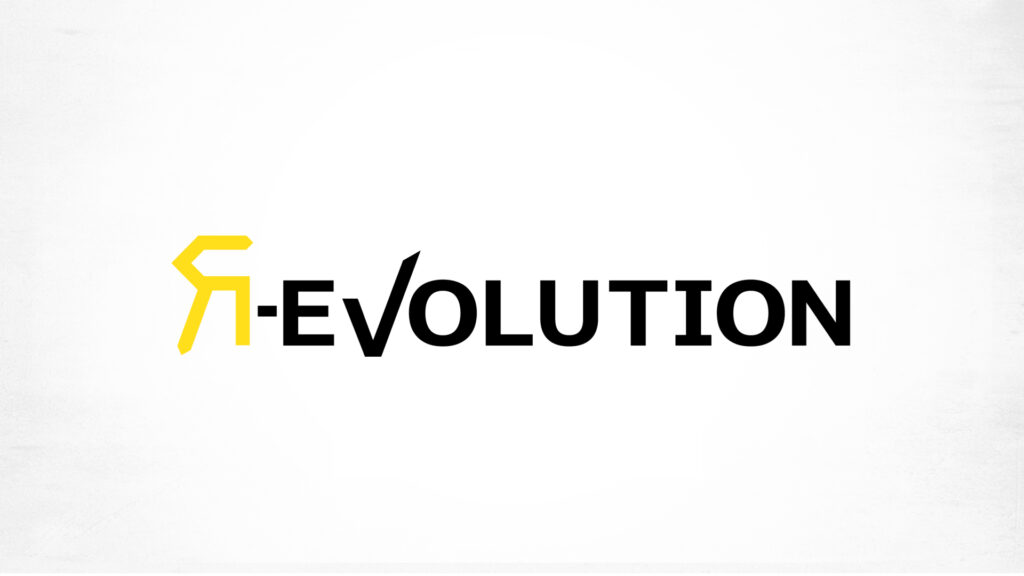
Variations and taglines
Based on the insights gathered from user research, it became evident that customers had diverse goals and aspirations. This highlighted the necessity to diversify our communication strategies to effectively cater to their varying needs.
Rationale of each logo
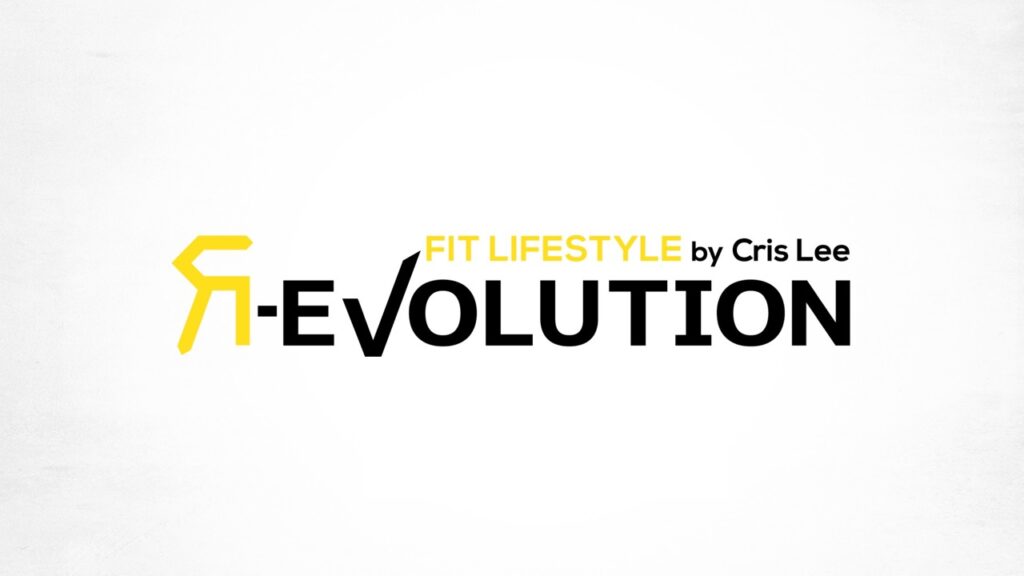
R-Evolution Fit Lifestyle
The primary logo incorporates the tagline “Fit Lifestyle,” which encapsulates the core philosophy of the business: R-Evolution is dedicated to fostering a lifestyle transformation.
The meanings of yellow are happiness, creativity, energy, brightness, vibrance.
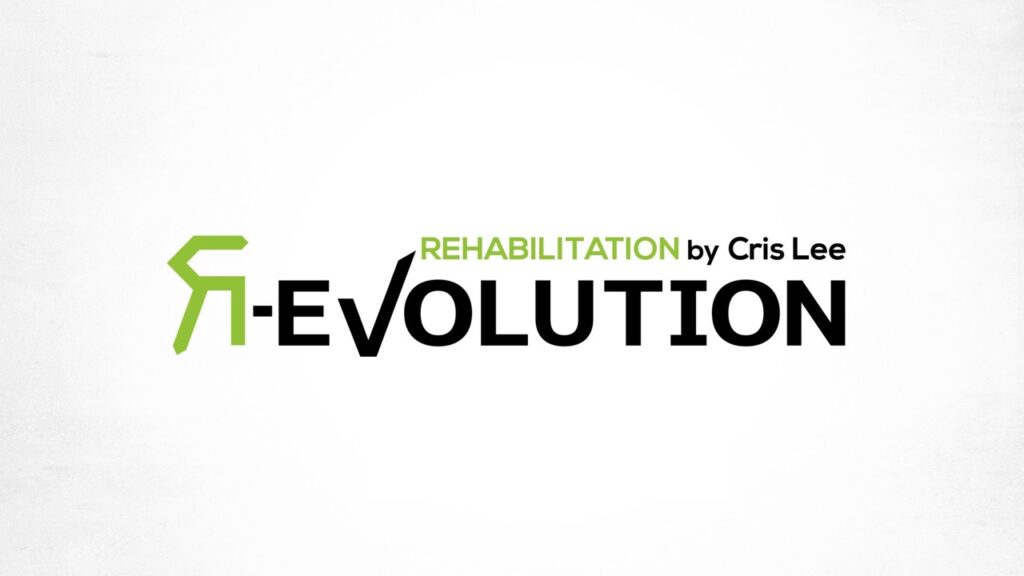
R-Evolution Rehabilitation
The Rehabilitation brand encompasses a comprehensive range of therapies, including physical therapy, osteopathic treatments, acupuncture, and various rehabilitative interventions, such as postural training.
The meanings of green are healing, nature, growth, quality, harmony.
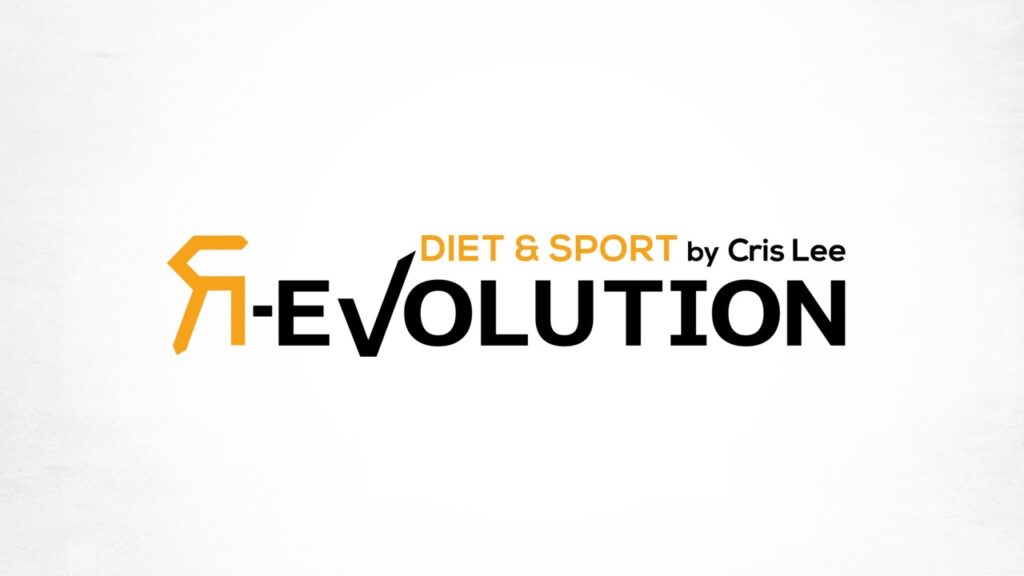
R-Evolution Diet & Sport
The Diet & Sport brand provides all-encompassing packages featuring personalized diet and training plans meticulously tailored for effective and healthy weight loss.
The meanings of orange are confidence, health, encouragement, bravery.
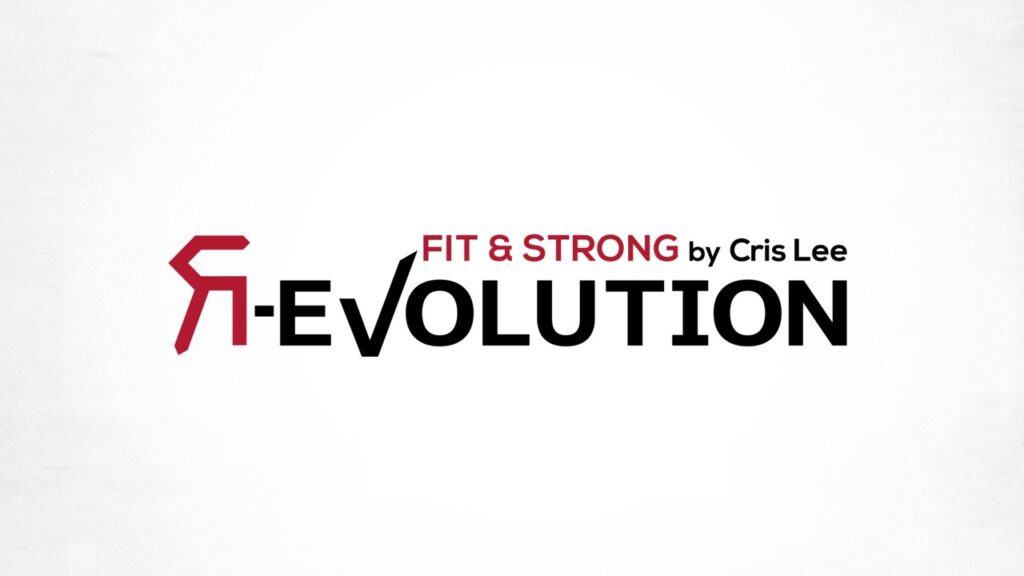
R-Evolution Fit & Strong
The Fit & Strong brand delivers comprehensive packages designed specifically for weightlifters and individuals engaged in intense, hardcore training regimens.
The meanings of red are power, strength, heat, passion, danger, anger.
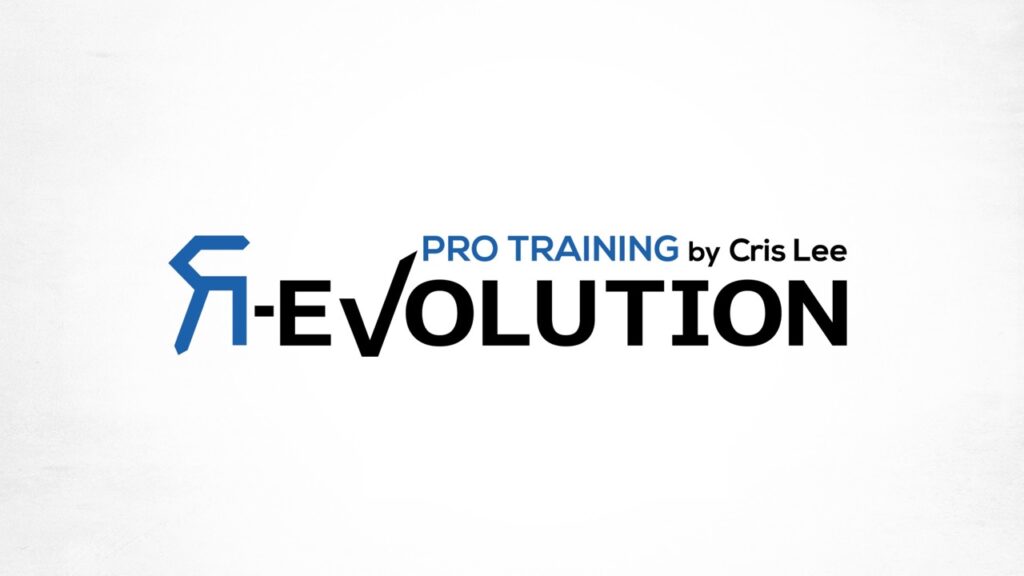
R-Evolution Pro Training
The Pro Training brand is tailored exclusively for sports professionals, catering to a diverse clientele ranging from synchronized swimmers and professional weightlifters to dancers.
The meanings of blue are competence, trust, loyalty, security.
Blue is also the colour used by the Italian teams during the Olympic colour.
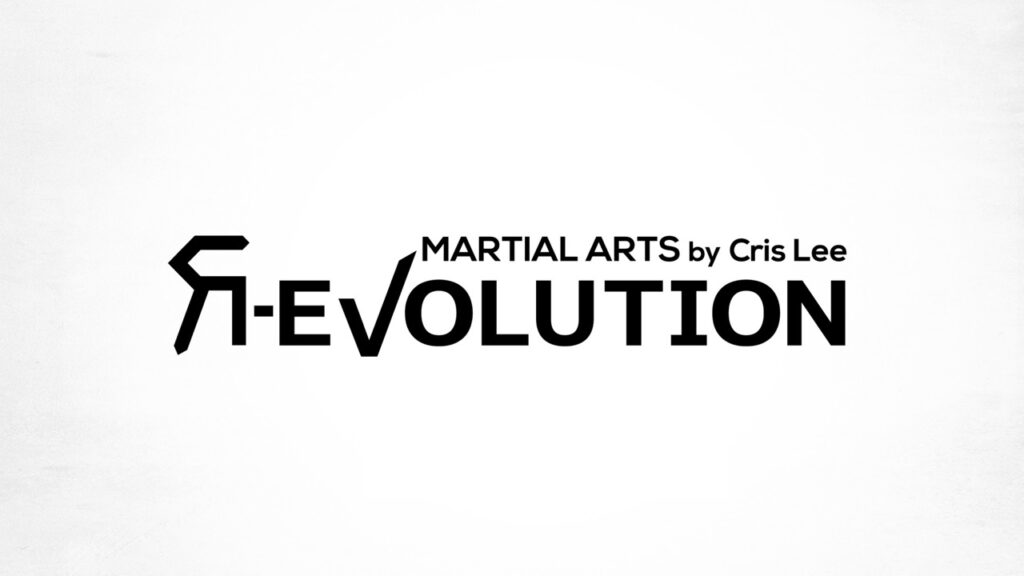
R-Evolution Martial Arts
Martial arts are increasingly popular, and are practiced, in R-Evolution, to obtain holistic results: a body and mind approach.
The colour black is often associated with martial arts thanks to the karate black belt. The meanings of the colour black are, among the otghers, power, elegance, sophiustication and mystery.
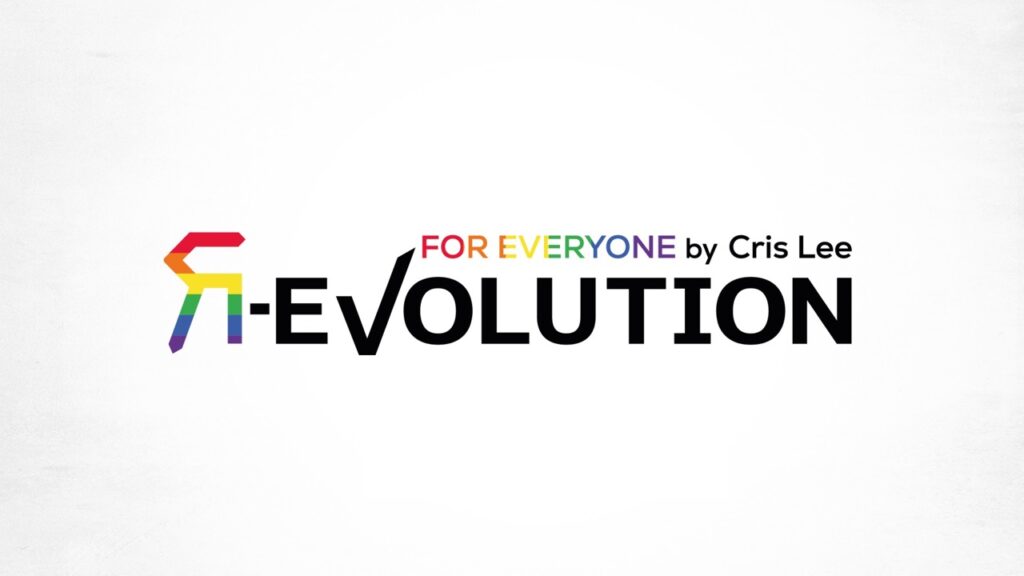
R-Evolution For Everyone
This version of the logo is used for promotional materials during Pride Month, to underline the commitment to diversity and inclusion. The colours used are from the traditional Pride Flag.
Apparel
Shortly after the brand launch, I created apparel specifically for the owner, as part of the strategy to promote the brand. Interestingly, the T-shirts gained significant popularity among our clientele as well.
To respect the privacy of the customers, the images featured here are of R-Evolution staff members who have kindly permitted their use.
Video tutorials
Many customers, especially those engaged in personal training or rehabilitation, receive home workout programs as part of their packages. However, a common issue arose: people often forgot how to properly execute the exercises and inundated the studio with phone calls seeking instructions.
To address this challenge, I took the initiative to establish the studio’s YouTube channel and developed over 100 mini-tutorials demonstrating the correct execution of each exercise. These tutorials are now seamlessly integrated into the training programs through clickable links.
This proactive measure significantly reduced the volume of phone calls by a staggering 95%, enhancing efficiency and customer satisfaction.
Covid-19: a hard, unexpected bump in the road!
(But not the end of the road)
In the late winter of 2020, Italy was severely impacted by Covid-19, leading to a nationwide lockdown starting on March 8th. The stringent measures confined residents to their homes, allowing only essential outings for pharmacy or grocery runs. This sudden halt in activity posed a significant challenge as businesses across the country came to a standstill.
In response to the crisis, the founder of R-Evolution and I collaborated closely to strategize ways to maintain business continuity and support customers, who were facing considerable hardships. Through conversations with several clients, we discovered that they sorely missed their training routines and were grappling with boredom, depression, and an uptick in baking endeavors. The situation was particularly challenging for those undergoing rehabilitation or doing postural training.
How could we help, while keeping the business alive?
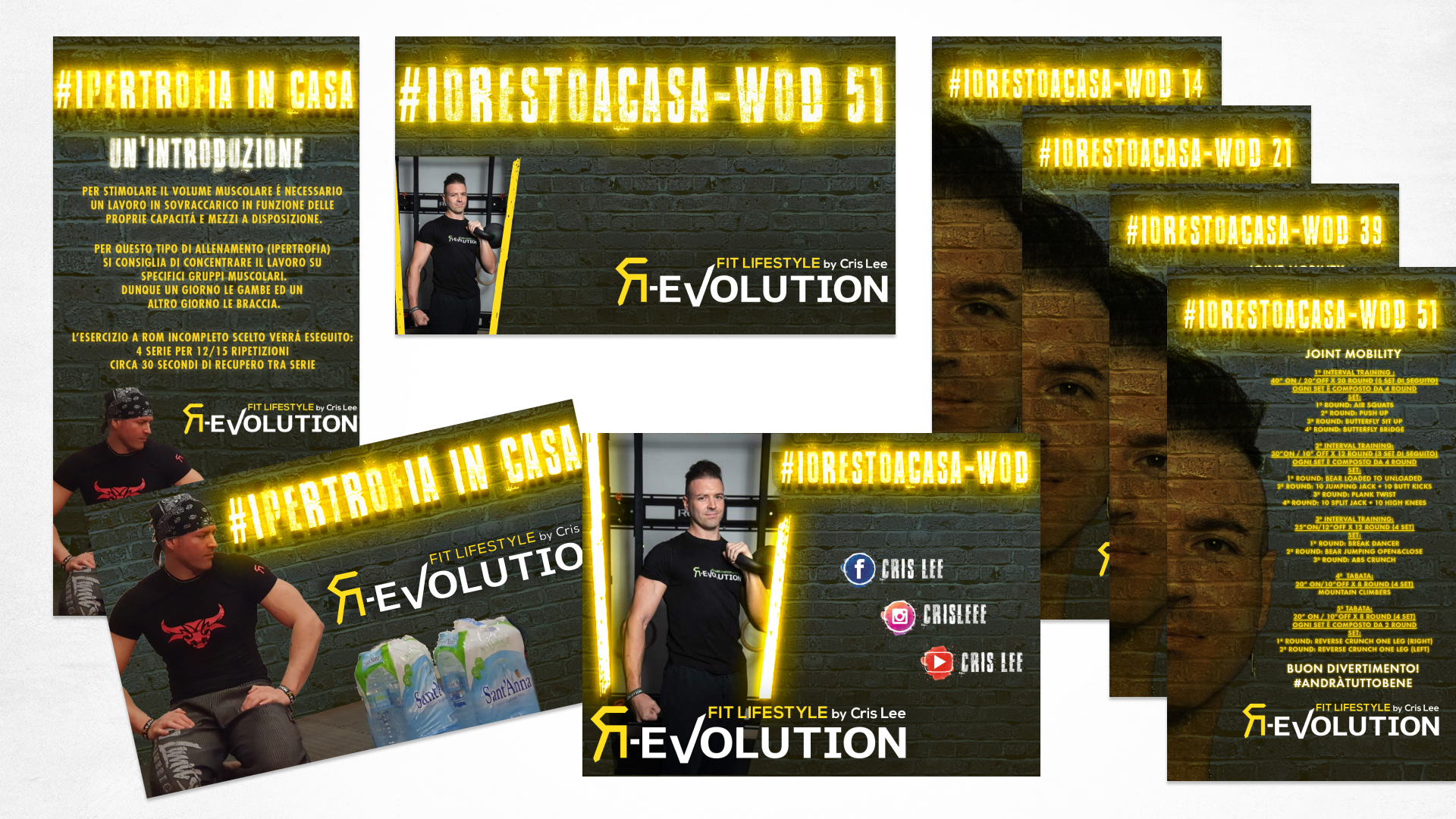
We brainstormed and introduced the #iorestoacasa brand, aligning with the government’s directive to stay home. For 53 consecutive days, we launched daily home workout programs. These routines were accessible, utilizing bodyweight or simple tools like water bottles as makeshift weights.
The founder filmed the videos in his home, and I handled the editing and designed all the promotional materials for social media. Each morning, we shared these programs via social media posts and accompanying instructional videos on YouTube.
Although offered free of charge and with the genuine desire to help out, this initiative led to a surge in new clients upon reopening the business. This growth was largely attributed to the viral spread of the training programs, with existing customers playing a pivotal role by sharing these resources within their networks.
#iorestoacasa (I stay at home) - the videos
The R-Evolution App
Following the success of the online initiatives during Covid-19, I suggested we built an app that would allow people to exercise from home while receiving professional guidance and customized training programs from R-Evolution’s staff.
The founder loved the idea.
I conducted targeted user research and updated the Personas, empathy maps, and user journeys that I had previously developed. Then, I created a LoFi prototype and tested it with a group of 15 users, predominantly existing clients. Based on their feedback, I refined the prototype into HiFi wireframes and handed them off to the developer.
However, as the initial fear surrounding in-person interactions began to wane, the in-person business experienced a surge in demand. We all longed to reconnect with others face-to-face, leading to a booming in-person business.
Given this shift, we made the decision not to launch the app. In-person operations were generating significantly higher revenue, and sustaining the app would have required additional staffing resources that were not available at the time.
Currently, the studio employs 10 people and is operating at full capacity. I am proud and happy about the role I played in bringing this success about, and am still collaborating with this client.







































